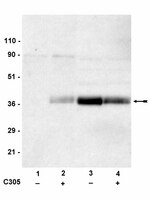Vav1 transduces T cell receptor signals to the activation of the Ras/ERK pathway via LAT, Sos, and RasGRP1.
Reynolds, Lucinda F, et al.
J. Biol. Chem., 279: 18239-46 (2004)
2004
Mostrar resumen
Vav1 is a signaling protein required for both positive and negative selection of CD4(+)CD8(+) double positive thymocytes. Activation of the ERK MAPK pathway is also required for positive selection. Previous work has shown that Vav1 transduces T cell receptor (TCR) signals leading to an intracellular calcium flux. We now show that in double positive thymocytes Vav1 is required for TCR-induced activation of the ERK1 and ERK2 kinases via a pathway involving the Ras GTPase, and B-Raf, MEK1, and MEK2 kinases. Furthermore, we show that Vav1 transduces TCR signals to Ras by controlling the membrane recruitment of two guanine nucleotide exchange factors. First, Vav1 transduces signals via phospholipase Cgamma1 leading to the membrane recruitment of RasGRP1. Second, Vav1 is required for recruitment of Sos1 and -2 to the transmembrane adapter protein LAT. Finally, we show that Vav1 is required for TCR-induced LAT phosphorylation, a key event for the activation of both phospholipase Cgamma1 and Sos1/2. We propose that reduced LAT phosphorylation is the key reason for defective TCR-induced calcium flux and ERK activation in Vav1-deficient cells. | Immunoblotting (Western) | 14764585
 |








